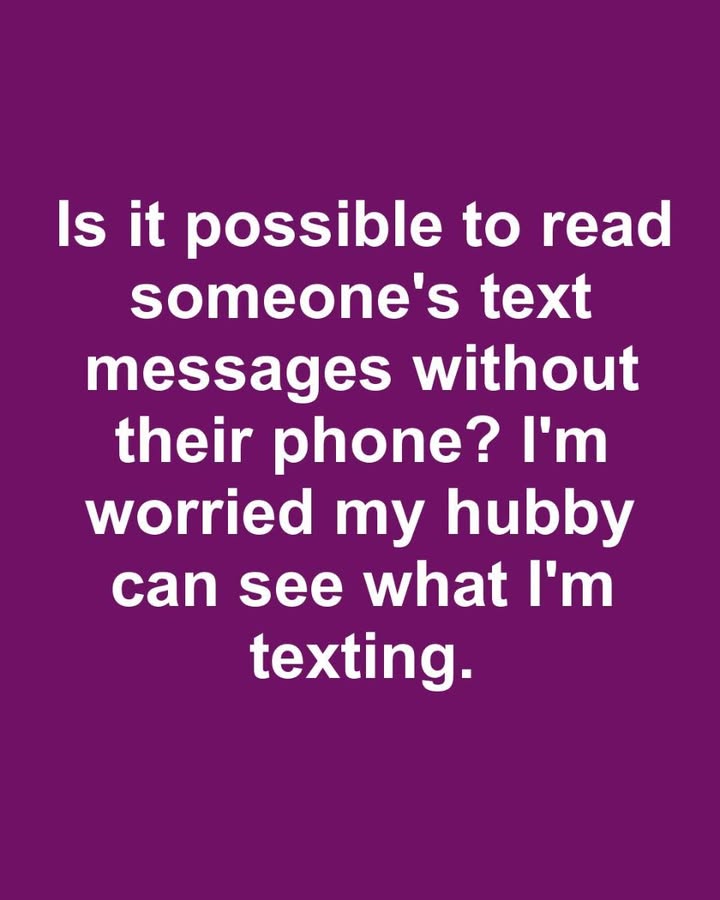In today’s digital world, where smartphones are an essential part of daily life, concerns about privacy and the security of personal information are more relevant than ever. With so much communication taking place through text messaging, people are understandably worried about whether their private messages could be accessed without their knowledge or consent.

This concern might feel a little unsettling, even creepy, especially when you consider how much of our personal lives are discussed over text. The question many people ask is simple: can someone read your text messages without physically having your phone? The answer isn’t straightforward, but understanding how text messages work and the technology surrounding them can help you protect your personal information. When you send a text, that message travels through a network of servers and connections before it reaches the recipient. Although most people think that only the sender and receiver can see the contents of a text, there are potential vulnerabilities along the path that could be exploited by someone with the right tools or intentions.
There are a few common methods people might use to read someone else’s messages without having access to their phone. These include installing spyware apps on the target device, exploiting weaknesses in cellular networks, or accessing backups stored in the cloud. Some spyware apps are sophisticated and can be installed without the phone owner even noticing. Once installed, they can transmit messages, call logs, and other data to a third party. In other cases, cloud backups that include text messages might be compromised if someone gains access to your email or iCloud/Google account. While some of these methods are technical and require a certain level of expertise, others might be more easily executed, especially if someone already has access to your accounts or knows your passwords.
It’s important to understand that accessing someone else’s text messages without permission is usually against the law. Laws related to digital privacy and electronic communications vary by location, but in most places, unauthorized access is considered illegal and can carry serious penalties. Beyond the legal consequences, there are ethical implications. Respecting others’ privacy is a cornerstone of trust in any relationship, whether it’s with a partner, a family member, or a friend. If you think your messages might be compromised, there are some telltale signs to look out for.
You might notice your phone battery draining faster than usual, the device becoming hot even when it’s idle, or receiving strange messages that don’t make sense. Sometimes, people begin to feel suspicious because someone seems to know things they’ve only mentioned in private texts. While these symptoms don’t guarantee someone is spying, they could warrant further investigation. Protecting your text messages starts with taking your phone’s security seriously. Always use a strong password or a biometric lock like fingerprint or facial recognition. Be selective about which apps you install, and regularly review what permissions they have. Keeping your phone’s software up to date is critical, as updates often patch security vulnerabilities. Avoid sending sensitive information over public Wi-Fi networks, or at least use a VPN to secure your connection. You might also want to switch to messaging apps that offer end-to-end encryption, such as Signal or WhatsApp. These apps make it virtually impossible for anyone other than the intended recipient to read your messages. Using a VPN adds another layer of protection by encrypting your internet activity, especially when you’re connected to less secure networks. If you believe someone might already be reading your texts, take action right away. Start by changing all your passwords and enabling two-factor authentication on every account possible. You might also consider performing a factory reset on your phone to remove any malicious software that could have been installed without your knowledge. If you believe your privacy has been seriously violated, contacting legal professionals can help you understand your options and how to proceed. In conclusion, while it is technically possible for someone to access your text messages without your phone, the good news is there are many steps you can take to prevent this from happening. By staying aware of the risks and taking practical security measures, you can protect your personal conversations from prying eyes. Always remember that trust and transparency are essential in any relationship, and open communication is far more valuable than digital snooping.





